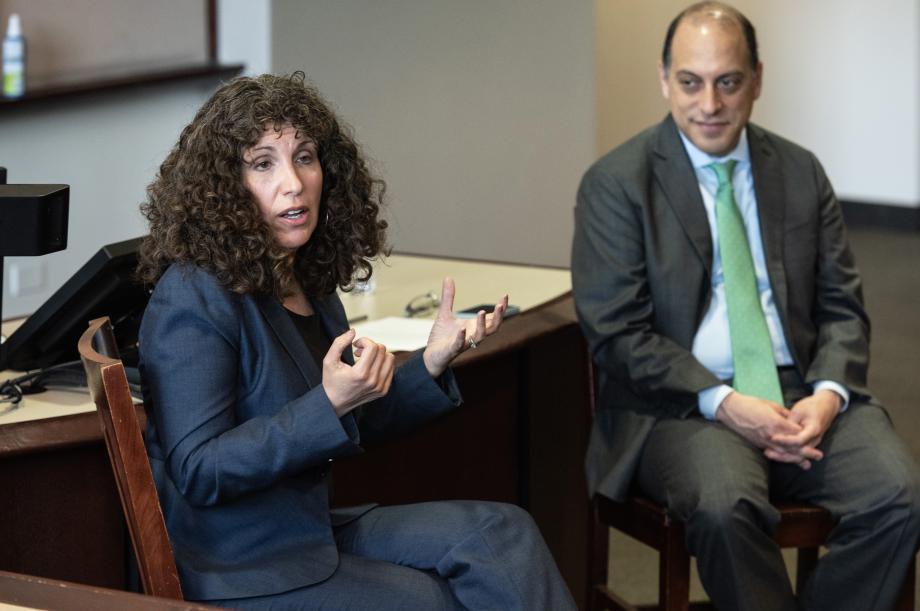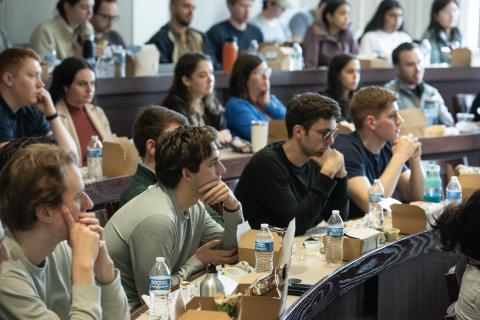Judge Myrna Pérez Shares Her Journey for Justice From Voting Rights to the Bench

Judge Myrna Pérez of the Second Circuit Court of Appeals in New York City began her journey growing up in Texas as the child of Mexican immigrants, with these experiences laying the groundwork for her lifelong commitment to justice.
At the Law School’s Edward Levi Distinguished Visiting Jurist Program on April 29, Pérez shared that from an early age, before she even had the vocabulary to articulate it, she recognized the impact of systemic inequality. She explained that she spent a lot of time as a child frustrated at things that just didn't seem fair, recalling a day when she had to try and get her homework done amidst the noise and bustle at the diner her mom worked at waiting on tables.
Pérez spent a good part of her formative years noticing inequality, fueling a passion within her for one of democracy’s most fundamental rights—voting. For Pérez, the right to vote transcends socio-economic barriers, embodying the ultimate safeguard against tyranny. “The great equalizing force,” is what she called it.
“When you step into the ballot box, it doesn't matter if you're rich or poor, black or white, educated or not. Your vote counts the same,” she said.
During her talk, moderated by Lior Strahilevitz, the Sidley Austin Professor of Law, Pérez discussed her journey of questioning inequalities and how that led her to a litigation career dedicated to voting rights and civil justice. It all started when she was an undergraduate at Yale and continued after she graduated from Columbia Law School.
Before her appointment to the bench of the Second Circuit, Pérez led the Voting Rights and Elections Program at the Brennan Center for Justice at NYU School of Law, where she was instrumental in litigating and advocating for fair and accessible voting practices. She discussed her successful suit in the Seventh Circuit against an Indiana law that allowed county elections officials to kick voters off the rolls without their explicit consent or notice, based on information obtained from a third-party database.
Pérez expressed the challenges she faced in litigating the case: “We had to demonstrate the relevance and the applicability of a statute that was created before the existence of the technology we are using today, and we had to explain why it still matters.”
The case highlights Pérez’s commitment to making sure legal frameworks adapt to modern challenges—without undermining the protections meant to safeguard democratic engagement.
Pérez also reflected on her time clerking for Judge Anita B. Brody on the Eastern District of Pennsylvania and Judge Julio M. Fuentes on the Third Circuit. She described Judge Brody as fearless, authentic, and politically adept, and lauded Judge Fuentes for his profound decency, a quality that she said was reflected in his interaction with every person he encountered, from the cleaning staff to colleagues.
This blend of attributes profoundly influenced Pérez, shaping her approach to her job and the respectful and inclusive environment she strives to foster within her own chambers. She also noted how she seeks to hire clerks with these same values.
When Professor Strahilevitz asked her what other qualities she looks for in a clerk, Pérez remarked that she did not think a clerkship should be thought of as a step on some professional journey. It is a job, where the clerks are lawyers to a constitutional officer who is going to be deciding really important things for people, ranging from whether someone stays in prison, to whether someone gets deported, to which party gets the millions of dollars at issue. A clerk, she explained, needs to have that nagging feeling that maybe something was missed or maybe something was not analyzed the way it should be or maybe there was more reading or research to do. “You have to really care,” about the work of the chambers, and the mission of the judiciary, she said.
Recounting the weight of the responsibility she carries with her on the bench, Pérez mused on how little her life has changed outside of her role as judge. Occupying spaces where people simply know her as “Myrna” has helped keep her grounded. She volunteers monthly at a local soup kitchen, where the simple act of service nurtures her humility. “The people I'm serving sausage to couldn't care less about what I do professionally. They only care about how good I make the grits,” she shared, laughing.
Pérez closed her talk with advice on mentorship, encouraging students to think about what exactly they are seeking when they say they want a mentor. “I think people use the word mentor to mean one of three things: someone who will help you get a job or remove barriers; someone you can turn to as a life coach and bounce ideas off of; and someone like a supervisor, who is training you to learn specific skills. So, it’s important to understand what you need, because it may or may not be a judge who can fill each of those roles.”
She also encouraged the students in the room to chart their own paths and keep growing while keeping their North Star in sight, to recognize the multitude of opportunities their education affords them, and to not confine themselves to narrow definitions of legal careers.
“You are at a phenomenal law school where they are teaching you so much. You have a lot of options,” she said. “There are a lot of ways you can serve your community and serve your families. There are lots of ways you can make yourself feel enriched and happy and like you're adding value, and you matter. Do not limit yourself with an artificial idea of what it means to be a lawyer or to have a law degree. Don’t cheat yourself by selling yourself short.”
Amber Hunter is a member of the Class of 2025 at the Law School. She grew up in the Bronx, New York and graduated from Syracuse University in the SI Newhouse School of Public Communications in 2019. Before law school, she completed a Fulbright Fellowship in Madrid, Spain and worked for a local NGO in Madrid for three years. At the Law School, Hunter is on the managing board of the Law Review, as an Online Editor, a student in the Civil Rights and Police Accountability Clinic and holds executive positions on the boards of the Black Law Students Association (BLSA), the Law Women’s Caucus and the Public Interest Law Society.
